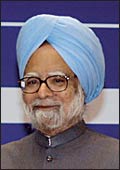|
India's
banking sector has demonstrated what we've always said: markets
are good for everyone-the country, the economy, businesses and
the common man. For proof, walk into your nearest bank branch.
Employees are more attentive and polite, customer convenience
is central to the services on offer and the table tennis tables,
which were as much a fixture at the larger public sector bank
branches a decade and more ago as tellers and ledgers, are now
conspicuous by their absence.
A silent revolution has swept through the
sector. The still persisting differences in décor and comfort
levels are purely cosmetic. In fact, as our survey (Page 56) reveals,
the likes of Corporation Bank, Andhra Bank and Punjab National
Bank have even overtaken global biggies like Citibank and Standard
Chartered Bank. Not just this; the sector has shown dramatic improvements
in other areas as well. Non-performing assets, a euphemism for
bad loans, have declined significantly, and loans to small and
medium enterprises-historically subject to much tug of war between
bankers and the government- is now a preferred asset class. Moral
of the story: competition and an enabling environment are as important
as proper regulation and strict enforcement of laws.
It's now accepted economic logic that a well
oiled financial sector is a necessary prerequisite for rapid economic
growth. It is here that the Indian banking sector-despite its
reach, depth and diversity-may be found wanting. The truth is
that our biggest bank, State Bank of India, will qualify at best
as a mid-sized one by global standards; other large Indian banks
like ICICI bank, Canara Bank and Punjab National Bank will be
considered small; and most of the rest will be below the global
radar. Consolidation is the obvious way forward, but regulations
in this regard are still hazy and unclear. The government needs
to immediately introduce regulations to allow for rapid consolidation
in the sector. And while at it, it should also allow voting rights
in line with shareholding. This will pave the way for the infusion
of fresh capital in the sector and prepare them for life in the
post-Basle II era. This is a window of opportunity that will close
unless immediate action is taken. It will be a shame if India
Inc's triumphant march to the world stage is held back by a limping
financial sector.
A Return To Fiscal Profligacy
 |
|
Manmohan Singh: Paytime before polls
|
When
elections loom large, fiscal rectitude becomes the first casualty.
Few governments are known to eschew such populism for short-term
electoral gains. And the populist United Progressive Alliance,
a rainbow coalition of different parties that is supported, in
turn, by the communist parties, could have been hardly expected
to be different. With six statesgoing to polls this year, it was
a great opportunity for the UPA government to be popular all over
again. Hence, the announcement by the Prime Minister, Manmohan
Singh, of setting up of a new Pay Commission should have hardly
come as a surprise.
The Prime Minister-toasted for guiding India
on the path of fiscal prudence during the early '90s- should have
known better. The havoc caused in the implementation of the Fifth
Pay Commission in 1997 by the United Front government must still
be fresh in his mind. In one stroke, it raised the wage bill of
the governments by as much as 1.5 per cent of the GDP and threw
many weaker states into virtual bankruptcy. While it did make
around 25 million babus happy, it was a nightmare for the governments
of most states.
The wage bill of the Centre, for instance,
jumped from Rs 21,885 crore in 1996-97 to Rs 43,568 crore in 1999-2000
and those of the states from Rs 51,548 crore to Rs 89,813 crore.
And while the pay hike was implemented in full, the other recommendations
were conveniently dumped. These included issues related to downsizing,
transfers, and moving from periodic pay commissions to a permanent
one that would constantly monitor inflation and other wage-related
factors.
The Prime Minister's argument-the states
are flush with surplus funds, around Rs 40,000 crore, and will
not find it difficult to meet additional expenses-doesn't cut
much ice. Their fiscal well-being can be directly attributed to
the recommendations of the 12th Finance Commission, which increased
the percentage share of state governments in overall taxes from
29.5 per cent to 30.5 per cent. In fact, the non-developmental
expenditure of states as a percentage of their aggregate receipts
jumped by nearly 6 per cent- from 12 per cent in 2003-04 to 18
per cent in 2005-06 -according to the Reserve Bank of India.
Any move to implement the new Pay Commission
is fraught with a host of dangers. While it will lead to greater
consumption because of the higher salaries, it will simultaneously
see a reduction in social sector and infrastructure spending.
The Centre, which skipped meeting part of its obligations under
the Fiscal Responsibility and Budget Management Act because it
had to transfer an additional Rs 26,000 crore in assistance to
states because of the 12th Finance Commission, will now find another
reason to defer the deadline for doing so. Another fiscal mess
could see the country's sovereign rating plummet and dent the
'India Everywhere' story.
All That Steel
 |
| Lakshmi Mittal: Steel resolve |
It
could be that it is hubris that is behind Mittal Steel's bid for
the Luxembourg headquartered Arcelor. Or it could be sound business
logic. It could also be that the genteel sensibilities of the
latter's CEO Guy Dolle may have been offended by Lakshmi Mittal's
query, at a private dinner in his house in London just a few weeks
before his company made its all-too-public bid, whether Arcelor
would be interested in a merger. Or it could just be that he doesn't
like Mittal the man since he has since mentioned that he doesn't
quite trust him and that the finance and workings of his company,
Mittal Steel, are opaque. Either way, this editorial isn't actually
about Mittal's m18.6 billion (Rs 96,720 crore) bid (since risen
along with the shares) for Arcelor to create a mammoth steel company
with a market capitalisation of over $40 billion (Rs 180,000 crore).
It is about an issue that countries and groups of countries (such
as the European Union and ASEAN) across the world will have to
address irrespective of the fate of the bid.
The Mittal bid for Arcelor could well be
the template for other such hostile bids in the future. It may
involve a large Indian it services company launching a bid for
a large American it services firm. Or a Japanese carmaker for
an American one. And the governments concerned may not even be
shareholders (in the Arcelor-Mittal instance, the state of Luxembourg
owns a 5.6 per cent stake in Arcelor). Yet, the governments involved
will need to look at the merger closely (and not say the kind
of things the leaders of most European governments said in the
wake of Mittal's bid) simply because it will involve the fates
of minority shareholders and, more importantly, employees in their
countries. The final decision in the Mittal-Arcelor instance,
may have to be taken by shareholders, but there is a role for
stakeholders such as governments to play. The sooner governments
figure out just what being a stakeholder is about, the better
for business.
|






